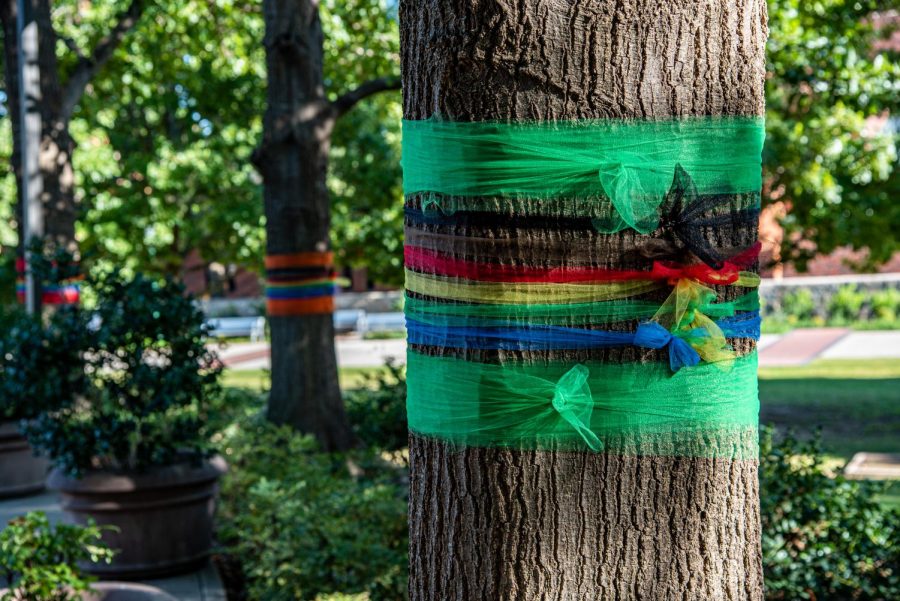Tarleton celebrates disabled women during Diversity Dialogue
The Office of Diversity and Inclustion decorated trees with LGBTQ+ ribbons in front of the Barry B. Thompson Student Center.
On March 3, at 12 p.m., Tarleton State University’s Office of Diversity and Inclusion and International Programs (ODIIP) hosted The Women’s History X Disability Diversity Dialogue. The speaker for this diversity dialogue, junior Lark Smith, educated the audience on disabled women in history, giving Women’s History month an empowering start.
In the presentation, Smith discussed the lives of women such as Noor Khan, a prominent British spy in World War II and Aaron Philip, the first black, transgender and physically disabled model to sign with a major modeling agency.
It’s women like Philip that led the way for the female disabled community. Smith explained that it wasn’t until recently that they knew of any prominent disabled women in history, so learning about Philip was exciting and uplifting.
“I haven’t seen anybody [a disabled women] that has ever been in the public eye as much as her,” Smith said. “Not only is she disabled, but she makes a point of always having her mobility device present. I thought it was so amazing that these modeling companies with such high standard and truly really quite cruel standards for their models would have Philip in their agency.”
The discussion of disabled women in the media also brings up another issue. Smith explains that there’s an underlying pity culture and that the narrative surrounding disabled women is that they deserve the attention solely because they’ve been dealt an “unfortunate card.”
“There’s this whole pity culture surrounding the disabled community, like oh no, you poor thing. I just want to see myself represented in something by people who truly deserve it. It’s just something that’s always affected me,” Smith said.
The decision to make this diversity dialogue about disabled women was one of deep meaning. Emily VanKirk, Tarleton’s ODIIP Student Specialist II and the Diversity Dialogue event coordinator explained that people of marginalized communities always hold more than one identity. For that reason, it is important to have conversations that run deeper than the surface.
“I hope to see a greater awareness of the impact of both women and folks with disabilities throughout history. Often when someone holds one identity that is marginalized, that can become the primary lens through which we view them,” VanKirk said.
The history of women especially those who are disabled, is often times overshadowed by the accomplishments of the same level by men in their field. It wasn’t until recently that we started to write women back into history, finally giving them credit where credit is due. An example of this is the recent publication of “The Philosophy Queens” by Rebecca Buxton. [Off the top of your head, I doubt anyone could name a female philosophy.]
That was the exact reason for the books creation.
Looking past the inequalities between men and women such as the wage gap and the ever present expectation that women should “stay in the kitchen,” there is also a noticeable change in behavior when dealing with women in the workforce. A 2016 Harvard study showed that female authors are undervalue compared to their male counterparts. “Women in an array of fields report experiencing treatment suggesting they’re less valued by employers than their male counterparts, including getting lower pay and fewer promotions, seeing male colleagues praised or taking credit for ideas that were first voiced by a woman but ignored or presumptions that a woman must be a junior team member in a coed working group, rather than the leader,” Harvard Staff Writer, Christina Pazzanese said.
These tough conversations are exactly what VanKirk hopes the diversity dialogue encourage. Being able to have mature conversation about tough topics is the most effective way to encourage us to keep having these conversations and being kind and open minded helps the participants move the conversation in the direction of progress. Having conversations on campus allow students to be themselves.
“I think it’s important to create opportunities for folks to share their knowledge and engage more deeply in a topic, as well as practicing skills that let us have engaging, civil, dialogue on a variety of topics,” VanKirk said. “I have witnessed students feeling more comfortable in their own skin due to the representation these dialogues have provided. I also have watched students grow as presenters and in their willingness to have the ‘tough’ conversations.”
During Women’s History Month, it is important to keep an open mind to the many injustices that women have faced over time. While society has improved tremendously on how we treat women there is still plenty of improvement to be done regarding the rights of women.
If you’d like to read the 2016 Harvard Study you can find it at news.harvard.edu/gazette/story/2016/02/women-in-mens-shadows/.
For more information about disabled women in history, you can check out these links provided to The JTAC by Emily VanKirk:
www.usaid.gov/what-we-do/gender-equality-and-womens-empowerment/women-disabilities
whitneylewjames.com/disability-activism/
www.adl.org/education/resources/backgrounders/disability-rights-movement
sailhelps.org/a-brief-timeline-of-the-history-of-disabilities-the-shameful-treatment-of-people-with-disabilities/
www.cdc.gov/ncbddd/disabilityandhealth/women.html
www.un.org/development/desa/disabilities/resources/women-with-disabilities-fact-sheet.html.
If you’d like to participate in upcoming diversity dialogues, you can follow Tarleton’s ODIIP @tarletondiversity on Instagram. You can also check Texan Sync to stay up to date on upcoming events.





